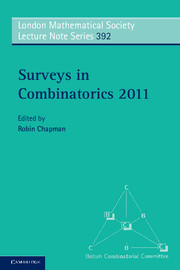Book contents
- Frontmatter
- Contents
- Preface
- 1 Counting planar maps, coloured or uncoloured
- 2 A survey of PPAD-completeness for computing Nash equilibria
- 3 Hypergraph Turán problems
- 4 Some new results in extremal graph theory
- 5 The cyclic sieving phenomenon: a survey
- 6 Order in building theory
- 7 Graphs, colours, weights and hereditary properties
- 8 Random geometric graphs
- 9 Transversals in latin squares: a survey
2 - A survey of PPAD-completeness for computing Nash equilibria
Published online by Cambridge University Press: 05 August 2011
- Frontmatter
- Contents
- Preface
- 1 Counting planar maps, coloured or uncoloured
- 2 A survey of PPAD-completeness for computing Nash equilibria
- 3 Hypergraph Turán problems
- 4 Some new results in extremal graph theory
- 5 The cyclic sieving phenomenon: a survey
- 6 Order in building theory
- 7 Graphs, colours, weights and hereditary properties
- 8 Random geometric graphs
- 9 Transversals in latin squares: a survey
Summary
Abstract
PPAD refers to a class of computational problems for which solutions are guaranteed to exist due to a specific combinatorial principle. The most wellknown such problem is that of computing a Nash equilibrium of a game. Other examples include the search for market equilibria, and envy-free allocations in the context of cake-cutting. A problem is said to be complete for PPAD if it belongs to PPAD and can be shown to constitute one of the hardest computational challenges within that class.
In this paper, I give a relatively informal overview of the proofs used in the PPAD-completeness results. The focus is on the mixed Nash equilibria guaranteed to exist by Nash's theorem. I also give an overview of some recent work that uses these ideas to show PSPACE-completeness for the computation of specific equilibria found by homotopy methods. I give a brief introduction to related problems of searching for market equilibria.
Acknowledgements
Currently supported by EPSRC Grant EP/G069239/1
Total Search Problems
Suppose that you enter a maze without knowing anything in advance about its internal structure. Let us assume that it has only one entrance. To solve the maze, we do not ask to find some central chamber whose existence has been promised by the designer. Instead you need to find either a dead end, or else a place where the path splits, giving you a choice of which way to go; see Figure 1.
- Type
- Chapter
- Information
- Surveys in Combinatorics 2011 , pp. 51 - 82Publisher: Cambridge University PressPrint publication year: 2011
- 5
- Cited by



